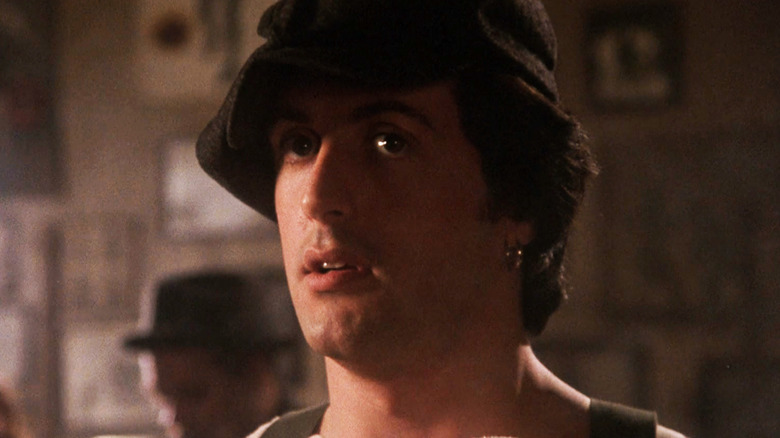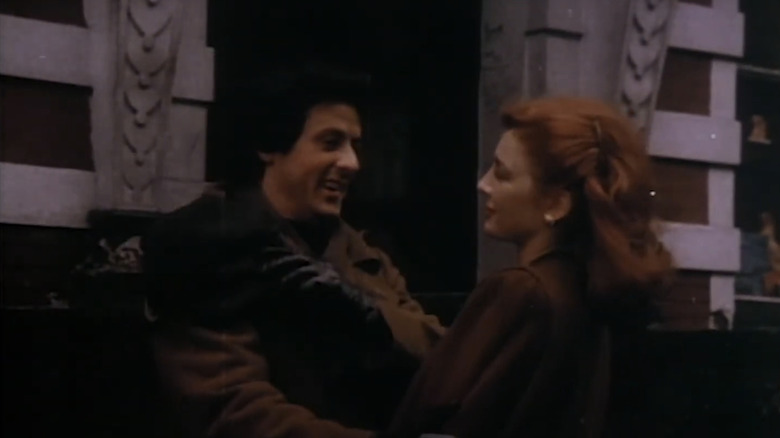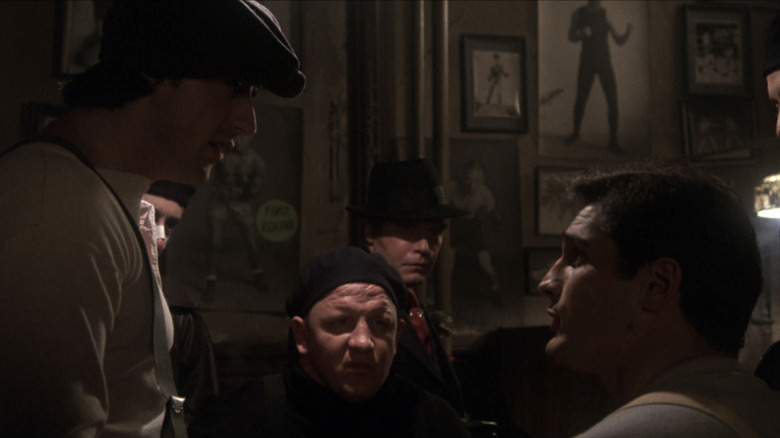Sylvester Stallone's Directorial Debut Was A Flop With Rocky Vibes
There are so many reasons why "Rocky" became such a massive hit in 1976, even if nobody besides writer and star Sylvester Stallone could see it from the outset. Sly was the only one who believed in the movie and, more importantly, in himself as its main character. Early on, after he enlisted producers Irvin Winkler and Robert Chartoff, and even after United Artists agreed to finance the film, Stallone faced intense pressure to give up the lead role to other more well-established performers. In fact, he almost lost the part of Rocky Balboa to Burt Reynolds, but stayed strong, resisting the pressure to step aside and essentially turning himself into an A-lister in the process.
Arguably, "Rocky" wouldn't have worked without Stallone's lead performance — at least, it would have been a very different movie. But it wasn't just this star turn that made the sports drama into a hit. Sly has always been a perceptive guy, and back in the mid-'70s, he'd noticed a trend in Hollywood that didn't sit right with him. As the actor told Barry Norman during a 1977 BBC interview:
"I felt at the time that cinema, at least the movies I had been seeing, were at an all-time low. Everything was anti-society, anti-Christ, anti-government, anti-everything and there was no one to root for. And I also feel that films are very cyclic, so I wanted to get back into the cycle of the films of the '40s and the '50s where people say, 'Hey, gee, I missed the good old films.' Yet, Hollywood hasn't taken heed and hasn't made any good old-fashioned type films where morality was at the forefront.'"
This was a major part of why "Rocky" was such a success. Its feel-good, never-give-up ethos was a salve for a cynical time, and Stallone had proved he wasn't just a star but a perceptive writer and creative. As such, you wouldn't blame studios for trying to harness this exciting new creative's energy for their own purposes, and in 1978, SLy was handed the reins to another sports drama that seemed perfect for his sensibilities. Sadly, though, things didn't quite play out the same way they had with "Rocky."
Paradise Alley was supposed to follow in Rocky's footsteps
After "Rocky," Sylvester Stallone starred in "F.I.S.T.," a 1978 crime drama directed by Norman Jewison in which Sly played a Cleveland warehouse worker who joins the fictional "Federation of Inter-State Truckers" (F.I.S.T.) union. The film was a modest success and garnered solid reviews from critics. That same year, however, Stallone also made his directorial debut in a movie that definitely wasn't a success in any sense.
"Paradise Alley" is a sports drama that was written, directed by, and starred Stallone. On paper, this seemed like a logical next step considering what he'd done with "Rocky," a sports drama which he also wrote and starred in. This time, the focus was wrestling, not boxing, with the film telling the story of three Italian American brothers who try to escape their meager 1940s Hells Kitchen existence via professional wrestling. Stallone played Cosmo Carboni alongside Armand Assante as his brother Lenny and Lee Canalito as the third Carboni sibling, Victor. After Cosmo convinces Victor to become a professional wrestler, things start to change for the brothers, who find themselves flush with prize money. That is, until gangster "Stitch" Mahon (Kevin Conway) decides to get involved, scheduling a fight between Victor and the ruthless Frankie the Thumper.
Stallone had actually written "Paradise Alley" as a novel prior to penning the script for "Rocky," which he did in an incredible three days. However, Sly had optioned his book to a producer and couldn't get him to relinquish control, which is what prompted him to write "Rocky" in the first place. But once that movie proved successful, Stallone was finally able to give "Paradise Alley" the big screen treatment. The film debuted on September 22, 1978, and unlike the Italian Stallion's debut, proved to be a considerable failure.
Critics were unrelenting in their reviews of Paradise Alley
"Paradise Alley" followed a similar narrative to "Rocky," with down-and-out protagonists fighting their way to success, overcoming seemingly insurmountable obstacles in the process while encouraged by a characteristically charming Sylvester Stallone and his everyman energy. It also featured several professional wrestlers, who played supporting characters. None of that was enough to save the film, though.
Not only did "Paradise Valley" make just $8 million on a $6 million budget, but critics were also merciless in their appraisal of the film. The New York Times' Vincent Canby, for example, described it as "a phony, attitudinizing, self-indulgent mess" and "a multimillion-dollar B (for boring) picture with the ear of a cauliflower, the heart of a hustler, and the soul of a used-car salesman." It should be said, however, that Canby wasn't exactly a fan of "Rocky," either. Still, he wasn't the only one who hated "Paradise Alley." Jay Scott of Toronto's Globe and Mail similarly wrote, "It has the cinematic mind of a 14-year-old in the glossy body of a major movie," while The Washington Post's Gary Arnold proclaimed, "Stallone hasn't done himself proud."
According to Sly, the negative critical response was actually a reaction to his behavior during the press tour for "Rocky." "I got into a lot of trouble with the first interviews I started giving after 'Rocky' came out," he told Roger Ebert back in 1980. "I kept some tapes of some of them and I was listening to them the other day. I come over with a pretty big opinion of myself, and I said a lot of things that were supposed to be funny but weren't. I got the critics down on me and they retaliated by attacking 'Paradise Alley.'"
The actor also claimed that studio intervention was a big reason for the film's failure. In a separate Roger Ebert interview, Sly said he would never forgive himself for letting the studio "manipulate" him during the editing process. According to him, multiple scenes were intended to add "atmosphere and character" to the movie but were cut at the behest of Universal Pictures, which wanted to "speed things along." Stallone claimed the studio removed 40 scenes altogether and that he added 10 of them back in for the broadcast version of the movie. But it certainly didn't seem like the critics were concerned about a lack of "atmosphere." Ever since, "Paradise Alley" has stood as one of Stallone's most unfortunate missteps (and this is the guy who got tricked into starring in "Stop! Or my Mom will Shoot").


